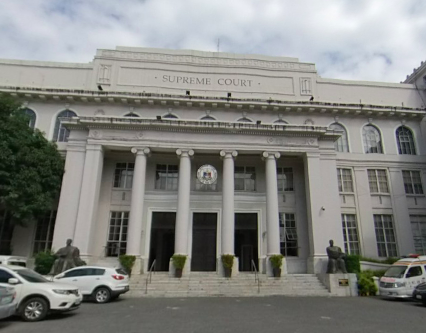SC allows embassy hearings through videoconferencing

Screenshot of the Supreme Court main building
MANILA, Philippines — The Supreme Court now allows court proceedings involving pleadings and testimonies from abroad, provided such hearings are held within Philippine embassies and consulates with the approval of the legation concerned.
In Circular 133-2021 released on Wednesday, Court Administrator Jose Midas Marquez said motions for videoconferencing from Philippine embassies or consulates may now be acted upon provided “that the concerned embassy or consulate allows the use of its facilities for videoconferencing.”
In December last year, the Supreme Court issued Administrative Matter No. 20-12-01-SC outlining the proposed guidelines for holding court proceedings “by electronic means.”
The court recognized such need stemming from the “imposition of community quarantine in varying degrees across the country, resulting in reduced court operations, suspension of hearings nationwide, except on urgent matters, and the physical closure of courts” due to the coronavirus pandemic.
However, the implementation of the guidelines on videoconferencing for the remote appearance from abroad was suspended early this year upon the request of Foreign Secretary Teodoro Locsin Jr.
Article continues after this advertisementThe country’s top diplomat cited the need to consider concerns raised by various foreign service posts, such as the extraterritorial application of Philippine laws and operational concerns due to COVID-19 and other circumstances.
Article continues after this advertisementBack in effect
But since the two orders suspending the implementation (OCA Circular Nos. 18-2021 and 56-2021) have lapsed, the guidelines may once again take full effect.
According to the guidelines, court hearings via videoconferencing are allowed “when a litigant or witness is an overseas Filipino worker or a Filipino residing abroad or temporarily outside the Philippines,” or “a nonresident foreign national who, while in the Philippines, was involved in any action pending before any court, and would like to appear and/or testify remotely from overseas.”
“Nonresident foreign nationals who would like to participate or testify [in court proceedings] through videoconferencing may do so upon proper motion with the court where the case is pending,” the guidelines state. “Such videoconferencing may be conducted only from an embassy or consulate of the Philippines.”
These guidelines apply to all actions and proceedings, including small claims cases, provided “the court finds that the conduct of videoconferencing will be beneficial to the fair, speedy and efficient administration of justice.”